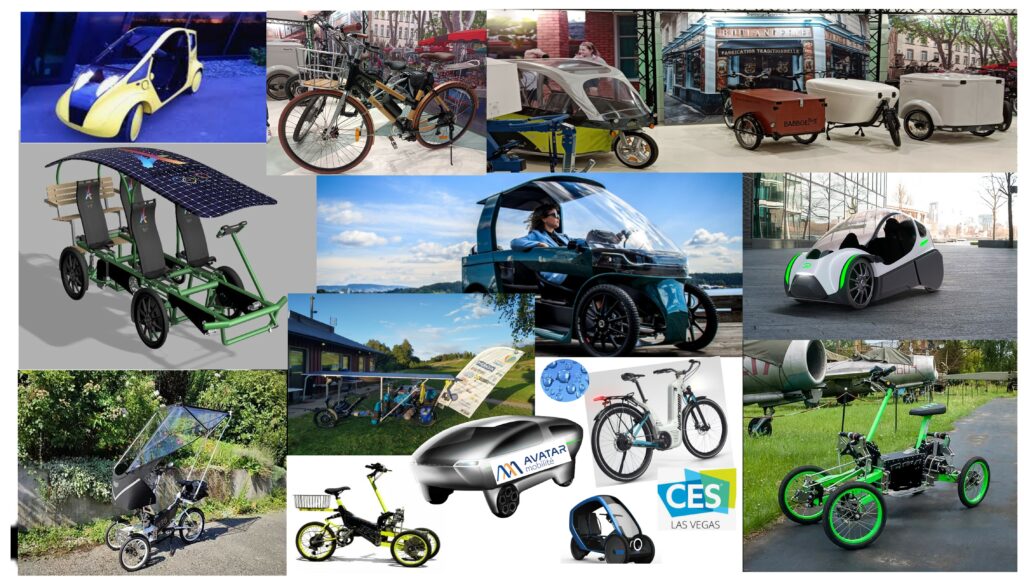Raise awareness, promote and co-develop regenerative ecosystems in innovative, inclusive, circular and low-carbon mobility to transform transport and reduce its environmental impacts.

Our Offer:
1 Diagnostics of active mobility of companies (travel, culture and intention) and local authorities:
- Comprehensive assessment of your company's or community's mobility
- Identification of problems and opportunities to improve active mobility
2 Realization of a Mobility Plan in 5 steps:
- Setting clear objectives for more sustainable mobility
- Identification of the measures to be put in place to achieve these objectives
- Development of a concrete action plan
3 Animation and creation of a CSR mobile path:
- Employee and resident awareness of sustainable mobility
- Creation of a CSR path adapted to your needs
4 Co-development of a regenerative, inclusive, circular and low-carbon mobility solution (multimodal solution):
- Identification of the current impacts of the ecosystem and the specific needs of employees and residents
- Co-development of a multimodal solution adapted to these needs
5 Annual monitoring & Reduction of carbon impacts:
- Regular monitoring of the implementation of the mobility plan
- Reducing the environmental impacts of your company's or community's mobility
6 Global turnkey offer (financing, warranty and maintenance):
- Turnkey offer to facilitate the implementation of sustainable solutions
- Financing, warranty and maintenance included
And some extracts of our Key offers (workshops, conferences, trainings & consultancy):
A) Mobility Strategy Assessment: We offer a comprehensive assessment of your company's mobility strategy, taking into account different transportation modes, employee needs, budget constraints and sustainability goals. We will provide you with concrete recommendations to improve your mobility strategy and optimize your environmental impact.
B) Sustainable mobility plan: We develop a tailor-made sustainable mobility plan for your company, taking into account the different transport options available, the needs of your employees and the sustainable development objectives of your organization. We help you implement this plan by providing communication tools, training and regular monitoring.
C) Support for the implementation of a mobility plan: We support you throughout the implementation of a sustainable mobility plan, by providing you with advice on the implementation of concrete solutions to reduce the footprint carbon from your business trips. We help you engage your employees in this process, by offering training and appropriate communication tools.
D) Assessment of the carbon footprint of your fleet: We carry out an assessment of the carbon footprint of your fleet of vehicles, taking into account CO2 emissions and fuel consumption. We offer you solutions to reduce the environmental impact of your fleet, by integrating electric or hybrid vehicles, by improving vehicle maintenance and by making your drivers aware of more responsible driving.
E) Training in sustainable mobility: We offer training in sustainable mobility for your employees, in order to raise their awareness of environmental issues and concrete solutions to reduce the carbon impact of their business travel. We can also organize practical workshops to help them adopt responsible behavior in their daily travels.
Some useful trainings to raise awareness, promote and co-develop regenerative ecosystems in inclusive, circular and low-carbon innovative mobility:
1) Regenerative Ecosystems Training: This training would allow participants to understand the key concepts of regenerative ecosystems, including natural resource regeneration, waste minimization, circular economy, social inclusion and sustainability. Participants could learn how to apply these concepts to mobility and transportation.
2) Inclusive Mobility Training: This training would focus on creating inclusive mobility solutions for people from all socio-economic backgrounds, including people with disabilities, older people and low-income communities. Participants could learn how to design accessible, safe and affordable transport for all.
3) Low-carbon mobility training: This training would help participants understand the different ways to reduce greenhouse gas emissions in transport, using advanced technologies, promoting active modes of transport and encouraging the use of renewable fuels. Participants could learn how to assess the carbon emissions of different modes of transport and design strategies to reduce them.
4) Circular economy training: This training would focus on the principles of the circular economy, including waste reduction, reuse and recycling of materials. Participants could learn to apply these principles to mobility and transportation by designing sustainable mobility solutions that minimize waste and promote reuse and recycling.
5) Co-development training: This training would help participants understand the key principles of co-development, including collaboration, co-creation, and community engagement. Participants could learn how to work with local stakeholders to co-create sustainable mobility solutions that meet community needs and foster stakeholder engagement.
By combining these different trainings, participants could acquire the necessary skills to raise awareness, promote and co-develop regenerative ecosystems in inclusive, circular and low-carbon innovative mobility.

